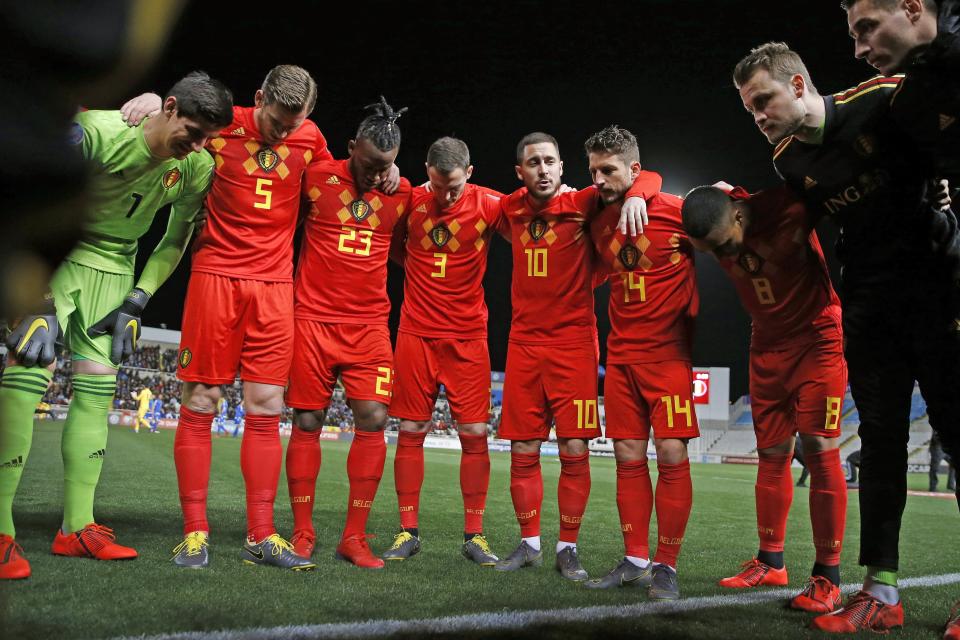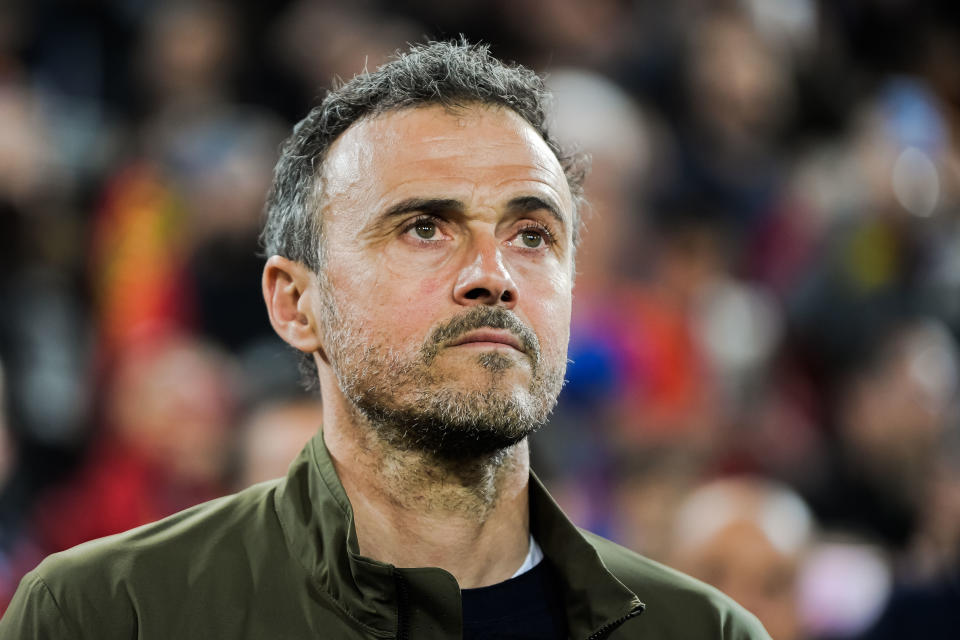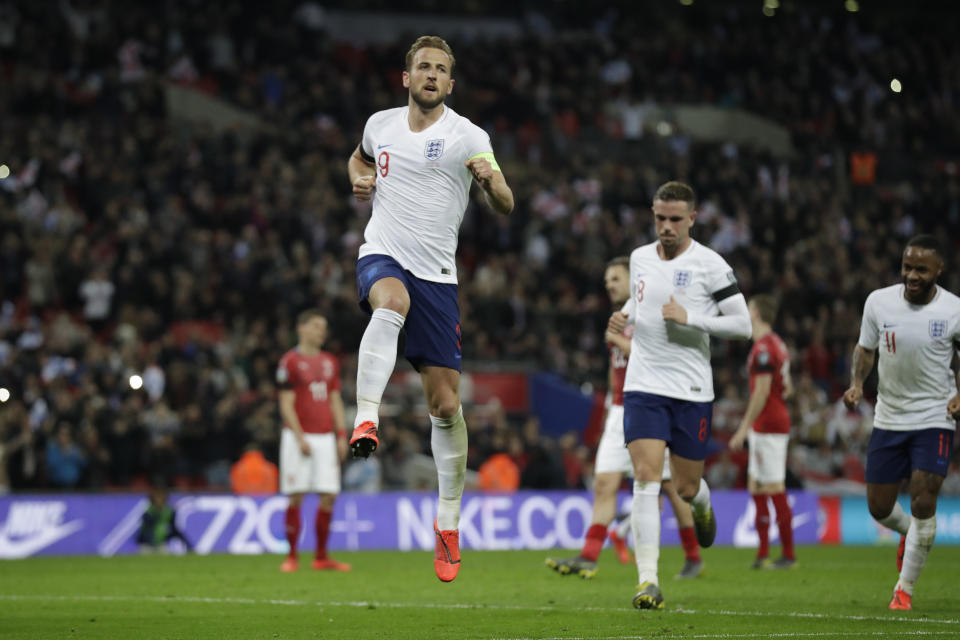Ranking the early favorites to win Euro 2020: Is it France and everyone else?

Qualification for Euro 2020 is well underway, and there have been relatively few shocks in the opening games, although Croatia’s loss to Hungary is a head-scratcher and Scotland’s heavy defeat in Kazakhstan is nothing short of embarrassing).
Over the course of the next year, UEFA’s 55 members will be whittled down to 24, who will compete in the sixteenth edition of the continental showpiece, which is to be staged across 12 different countries. In anticipation of the tournament, Yahoo Soccer has power-ranked the five most likely winners. We kick off with a nation which isn’t used to being ranked so low ...
5. Germany
Unless you’ve been living under a rock since last summer, you may know that Germany is in something of a downturn.
After entering the 2018 World Cup among the favorites and leaving rock-bottom of their group, Joachim Löw’s men then failed to win any of their games in the UEFA Nations League — resulting in relegation from the top tier of the new format, which helps determine qualification for the European Championship. Germany’s recent win over fierce rivals Holland, courtesy of a 90th-minute goal, represents their only competitive win of 2019.
So why, on this evidence, would we rank Germany in the top five?
Well, firstly, because they are Germany. They are a team designed to prosper in tournaments, and who have serious pedigree in the Euros. They have won three times, reached the final six times and made the semifinals on nine occasions.
Secondly, they have a better chance of success than most other major nations who didn’t make this top five. Reigning champion Portugal is unlikely to get results with their dreary style (they’ve drawn their last four games), and talisman Cristiano Ronaldo will be 35 by the time the tournament starts. Croatia’s World Cup finalists have slumped since their time in Russia and may not enjoy a favorable route to the final this time. And the Dutch, as impressive as they have been, are a young side who lack experience on the big stage, having failed to make Euro 2016 and last summer’s World Cup.
The third and most important reason to back this new-look Mannschaft is the way they have reacted to Löw’s recent shake-up. Leroy Sane, for example, was hugely impressive partnering fellow wide man Serge Gnabry in a front two against the Netherlands, and both players are vastly improving with every domestic game they play.
The players aren’t yet used to the new formation, and the defense may take time to settle down after the departure of Mats Hummels and Jerome Boateng. But the Germans have traditionally shown they know how to bounce back from a nadir.

4. Belgium
Before the 2014 World Cup, Belgium was lost in the wilderness, having failed to qualify for five straight major tournaments between 2004 and 2012. The 2014 World Cup campaign sewed the seeds of a new “golden generation”, who were expected to conquer the world like Spain had done in the years prior.
However, despite the incredible strength of their squad on paper, the current Belgian side has underdelivered. Their best chance of making a statement came last summer, and they probably would have finished higher than third at the World Cup if they had not met eventual winners France at the semifinal stage.
Euro 2020 may be the final opportunity for this set of players to live up to their reputation. Kevin De Bruyne and Eden Hazard may be at their peak next summer (they will be 29 and 28 respectively) while Vincent Kompany, Jan Vertonghen and Dries Mertens will be well into their thirties.
The Red Devils comfortably won both their recent qualifiers and have only registered two defeats in their last 34 matches, dating back to September 2016. Some may register doubt in Roberto Martinez’s credentials as a title-winning manager, but Belgium is likely to be a going contender in the latter stages of this competition.

3. Spain
Much like Germany, Spain is a team in transition. After sitting on top of the world by becoming the first nation to win three consecutive combined World Cup and European titles, La Roja have failed to clear the round of 16 in their last three tournaments. In Russia last summer, they only managed to beat Iran and were humbled by the hosts when their plan to play endless sideways passes didn’t work out.
That World Cup campaign, of course, was somewhat sabotaged by Julen Lopetegui’s last-minute departure, but a shake-up has been in the cards since Spain failed to secure a spot in this summer’s UEFA Nations League finals.
“We are in a phase of evolving as a team and competition makes us better,” manager Luis Enrique said last week, after calling up a squad that has cut out some of the old guard. Saul, Koke and Thiago did not make the roster, while the likes of Iker Muniain, Sergi Gomez and Sergio Canales made the cut.
Alvaro Morata was wasteful in the Euro qualifier victory over Norway, and Enrique hopes the struggle to find a consistent striker may be solved by Jaime Mata, who has earned his first international call-up of any kind at the ripe age of 30. The Getafe forward has been enjoying a sensational season, scoring 13 La Liga goals.
Despite the transition in personnel, Spain is sticking with the world-beating formula of possession-based soccer. “Our plan is still the same, to carry the initiative and not let our rivals dictate the match,” Enrique said.
There are a few issues to resolve and some new faces to acclimate. But unless the manager bails a few days before the tournament starts again, Spain should be set for a deep run at Euro 2020.

2. England
For the past two decades, the England national team has been a perennial underachiever. If the Three Lions escaped the group stage of any tournament, it was considered a surprise for most fans. Cynicism levels shot off the charts at the last European Championship, when Roy Hodgson’s feckless side was ousted by Iceland.
But that all changed last summer.
England was given an injection of positivity and excitement by manager Gareth Southgate, who was the last person on earth expected to make the national team interesting when he succeeded Sam Allardyce. A member of the most recent England team to excite the nation — the Euro 1996 semifinalist that crashed out thanks to Southgate’s own penalty shootout miss — the former Aston Villa defender has brought belief back to the English camp.
It also helps that the current crop of England players is among the best in recent memory. The typical English side features two of the Premier League’s best fullbacks in Kyle Walker and Danny Rose, a highly dependable young anchor in Declan Rice, two outstanding wide men in Raheem Sterling and Jadon Sancho, and one of the best strikers on the planet: Sir Harold Kane.
One of the most promising aspects of this side is that there is no single star player carrying the weight of expectation (see: Wayne Rooney in the past) and no clear idea of the best starting XI. The Three Lions currently boast the best squad depth in international soccer.
England tends to breeze through qualification campaigns against lowly competition, but can be guilty of running out of ideas when meeting bigger sides in high-pressure situations. This group of players, however, should come well-prepared from encounters with European titans at the UEFA Nations League finals.
The biggest boon for this England side might be home advantage: Both semifinals and the final will he held at Wembley. The idea of triumphing at the “Home of Football,” on the same hallowed turf where the vaunted 1966 team won the World Cup, will be a huge motivator.

1. France
Few teams in international soccer experience the giddy highs and mutinous lows of the French. Unfortunately for the rest of Europe, Les Bleus are at their zenith right now.
They reached the final of the last European Championship — where they were worn down by a dogged Portugal display — and are the reigning World Cup champions. It cannot come as a surprise that they are the favorites to win this tournament with most bookmakers.
This French squad is deep in virtually every department and has youth on its side: Olivier Giroud and Blaise Matuidi are the only outfield players on the wrong side of 30. In Paul Pogba and Antoine Griezmann they have world-class talent going forward, but the star of the tournament is likely to be Kylian Mbappe.
By the time the tournament comes around, the 20-year-old may be a €280m Real Madrid galáctico. He finished last summer’s World Cup, his first major tournament, with four goals and a winners’ medal, so it stands to reason that he will be a frontrunner for the Golden Boot.
France can be unpredictable — a tournament disaster is never far away — and won’t have a “home” game at Euro 2020, as the nation’s federation didn’t even bid to have one of its stadiums included in hosting. But Les Bleus are clearly the strongest team in Europe right now.
More from Yahoo Sports:



